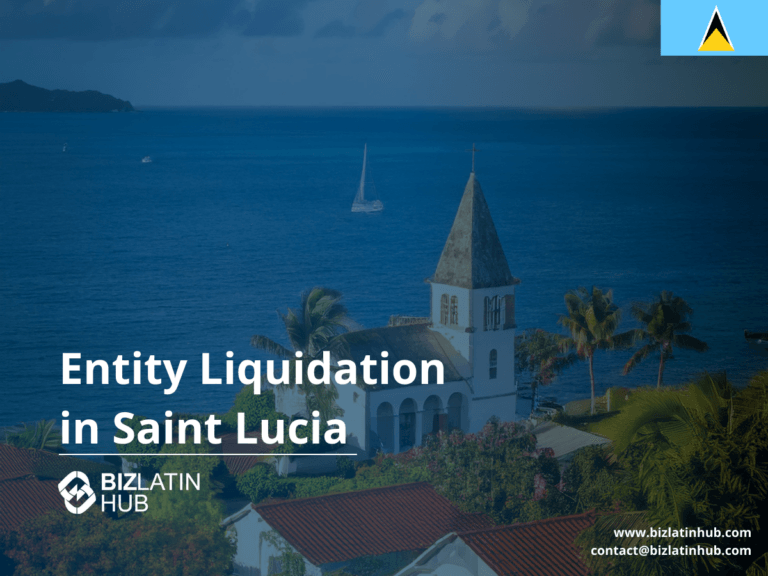Liquidation (winding‑up) of a company in Saint Lucia is governed by the Companies Act, Cap. 13.01 and related legislation, including laws specific to International Business Companies (IBCs) and financial/licensing regimes. Just as with initial company formation in St Lucia, liquidation must be above board. The process depends on whether the company is voluntarily winding up or being wound up by the Court. You will need to attend to regulatory filings, creditor claims, notices, notice in Gazette, meetings of creditors/shareholders, final returns, etc.
Key takeaways on how to liquidate your business in St Lucia
| 6 steps to liquidate a company in St Lucia | Determine whether the winding‑up will be voluntary or by order of the Court, depending on solvency, whether creditors are involved, or if the law requires. If voluntary, the directors must convene a meeting and the shareholders must pass a resolution to wind up. Present a petition to the Court (if winding up by Court is required or if creditors etc. demand) under the Companies Act. Appoint one or more liquidators. Notify creditors and contributories. Publish notices of winding up. Prepare periodic and final accounts of the liquidation. Hold final meeting(s) of company and creditors. |
| What is the timeframe needed to liquidate your business in St Lucia? | It depends on size and complexity. For a simple voluntary winding up, minimal assets or liabilities, few creditors, and no regulatory complications, maybe a few months. |
| What are the reasons to liquidate a business in St Lucia? | These vary, but the key point is to stay compliant and in good standing with the authorities. |
| What causes involuntary liquidation in St Lucia? | This is usually triggered by not being able to pay debts to creditors. |
Key Steps for Liquidation in Saint Lucia
Below is a bulleted list of the general process to liquidate a company in Saint Lucia:
- Determine whether the winding‑up will be voluntary or by order of the Court, depending on solvency, whether creditors are involved, or if the law requires. The Companies Act provides for both modes.
- If voluntary, the directors must convene a meeting and the shareholders must pass a resolution to wind up.
- For a voluntary winding‑up, prepare a statutory declaration of solvency by the director(s), stating that after a full enquiry into the affairs of the company, they believe the company can pay its debts in full within a specified period (not exceeding 12 months). This declaration must be made within 5 weeks before the resolution and filed with the Registrar before the resolution.
- Present a petition to the Court (if winding up by Court is required or if creditors etc. demand) under the Companies Act. Any one of (company, creditor, contributory) may petition.
- When winding‑up is by Court, commencement is deemed at time of petition; when voluntary, at the time of passing the resolution.
- Appoint one or more liquidators. The resolution or Court order will name or empower a liquidator to act. Liquidator’s duties include collecting/company assets, realising them, paying debts/creditors, and distributing any surplus to shareholders/contributories.
- Notify creditors and contributories. For creditor‑voluntary winding‑ups, the company must summon a meeting of creditors at or near the time of the resolution to wind up, provide a full statement of affairs and list of creditors.
- Publish notices: in the Gazette or a newspaper of general circulation, of winding up, meetings, etc. Also, in any invoice, order or business letter issued by or on behalf of the company (or liquidator) the document must indicate that the company is in liquidation.
- Prepare periodic and final accounts of the liquidation showing how assets have been disposed, liabilities discharged, and how any surplus is distributed.
- Hold final meeting(s) of company and creditors: once affairs are fully wound up, the liquidator must call such meetings, lay the account, provide explanation, then file the account with the Registrar, file returns of meetings.
- After the final return is filed, the Registrar may strike the company off and the company is deemed dissolved. The date of dissolution is recorded via Registry.

Legal & Regulatory Context
- The relevant statute is the Companies Act, Cap. 13.01 (Saint Lucia), which has provisions implemented under the Revised Laws.
- There are special provisions for International Business Companies (IBCs) under the International Business Companies Act. These have particular requirements for a plan of dissolution, submission of “articles of dissolution” to Registrar, notices, etc.
- Licensed financial institutions or banking / financial holding companies have additional rules under the Banking Act / Central Bank, including requirements that the institution be solvent and that debts to depositors and creditors are satisfied under certain time periods.

Common Pitfalls & Challenges
- Failing to make the statutory declaration of solvency properly (wrong timing, not enough enquiry into affairs).
- Missing the required notices or failing to publish in the Gazette or a newspaper, or failing to include the “company being wound up” statement on business documents.
- Delay or oversight in notifying creditors, not giving them sufficient chance to submit claims.
- Not complying with reporting/accounting obligations, failing to furnish accounts or returns of meetings to Registrar.
- For regulated entities, not obtaining required authorizations (e.g. from Central Bank) or not reflecting licensing / regulatory clearances.
- Directors or officers failing to disclose all assets or improperly disposing of company property — these are offences under the Act.

FAQs on company liquidation in St Lucia
Here are frequently asked questions that we receive from clients.
The cost will depend on:
Whether the winding‑up is voluntary or court ordered;
The complexity: number of assets/liabilities, creditors, whether a regulated entity;
Fees for liquidator, legal/advisory services, accounting;
Registry / government fees for filings, notices, publications;
Possible regulatory or licensing body costs (if applicable).
There is no one flat fee; simple solvent voluntary liquidation will cost less; more complex or contentious/liability‑heavy cases cost more.
It depends on size and complexity. For a simple voluntary winding up, minimal assets or liabilities, few creditors, and no regulatory complications, maybe a few months. Court petitions, creditor disputes, regulatory approvals can extend the process significantly.
You will need to notify:
The Registrar of Companies (Registry) – file relevant resolutions, petition, final return, etc.;
Creditor(s) – inviting claims; contributories/shareholders;
Publish notices in Gazette or a newspaper of general circulation;
Use “being wound up” notice on invoices/orders/business letters issued by company or liquidator.
If the company is licensed/regulated (financial institution, banking, or others), the relevant regulatory authority (e.g. Central Bank).
Generally, shareholders have limited liability. However, officers or directors may be personally liable in certain circumstances, including:
If a director makes a false or reckless declaration of solvency;
Failing to disclose all assets or otherwise not fulfilling legal obligations;
Misconduct, fraud, or improper actions before or during winding up.
Also, there are offences for officers who do not deliver property of the company to the liquidator or misrepresent or omit material facts.
Once liquidation or winding up begins:
The liquidator evaluates all existing contracts, leases, and obligations.
Some contracts may be terminated, renounced, or disclaimed (if onerous) under provisions in the Act.
Obligations must be fulfilled if beneficial, or appropriately dealt with (settlements, renegotiations).
Liabilities under leases or contracts form part of the debts to be paid, subject to priority and the assets available.
Yes. Even though the tax regime of Saint Lucia may differ from other jurisdictions, companies have statutory obligations to:
Ensure all tax filings are up to date with the Inland Revenue Department;
Pay any outstanding taxes, duties, fees, licenses;
Handle any regulatory fees or compliance obligations;
Provide final accounts or audited statements if required;
Obtain any certificates of good standing or tax clearance if required by regulators or for distribution of assets.
Biz Latin Hub can help you with entity liquidation in St Lucia
At Biz Latin Hub, our multilingual team of company formation specialists has extensive experience in supporting foreign executives when starting a business in Latin America. We offer a complete set of services for your business needs, such as legal, accounting, and recruitment support.
You can rely on us as your main contact for entering and doing business in any of the 18 markets in Latin America and the Caribbean where we operate.
Contact us now for personalized assistance or a free quote on company formation in Latin America.
Learn more about our team and expert authors.





